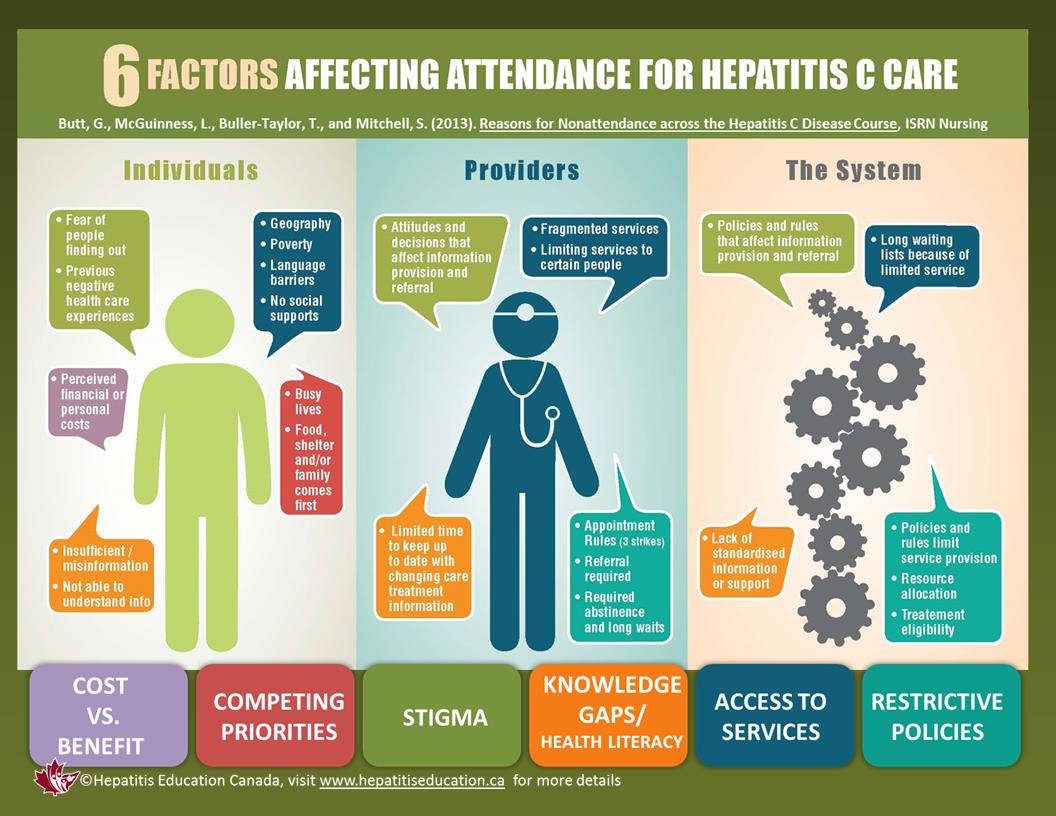Stigma & Discrimination
People living with hepatitis C (HCV) frequently report experiences of stigma in health care settings. Stigma increases the burden of the disease as it can lead to a lack of testing, treatment and primary care. It is one of six main factors that contribute to people not getting the hepatitis C care they need.
(click bars to open/close)
Stigma and Hepatitis C
- Stigma occurs when a person is negatively judged and devalued because of their HCV status. This includes self-judgment or media portrayals of HCV and can result in discrimination towards people living with the illness hepatitis C.
- Hepatitis C is stigmatized for being a contagious disease and for its association with illegal drug use.
Fears about transmission are fueled by inaccurate knowledge about HCV and moral judgements about drug use. - Discrimination occurs when someone is treated differently or negatively because of their HCV status. Examples of discrimination include: avoidance of a person with HCV, inappropriate precautions against infection and breaches of confidentiality.
What can a health care provider do to prevent stigma?
The health care setting is pivotal in supporting people as they cope with the physical & social consequences of HCV. Many people will only disclose their HCV status to health care providers. Yet, experiences of stigma happen often at diagnosis, leading people to avoid health care. Health care providers, aware of the stigma towards HCV, can play two important roles in:
- Preventing stigma by creating a safe & positive health environment
- Providing support for stigmatized people to prevent declines in quality of life
Preventing stigma by creating a safe & positive health environment
Individuals with HCV are often anxious about the reactions of others. These tips may help to create an environment of trust & non-judgment that will encourage people to engage with health care:
- Use standard universal precautions with everyone & no one will feel pressured to disclose to protect others
- Avoid the question of how people acquired HCV so people won’t fear poor treatment because of associations with drug use
- Follow policies of confidentiality & assist people to determine who needs to know about their HCV diagnosis
- Acknowledge the expectations of active drug users about problems in obtaining pain relief to begin a discussion about an appropriate dose for them
Once can also establish a trusting patient-provider relationship by:
- Using non-judgmental language about substance use; avoid terms like addict & drug abuser
- Providing information on transmission risks, the social, psychological & physical effects of drug use as well as the effectiveness of & access to treatment
Providing support for stigmatized people to prevent declines in quality of life
- Anticipate & monitor – inform & assist people with disclosure & monitor for loss of social network support
- Refer to community resources – discrimination towards people with HCV is against the law
- Support self-advocacy efforts – see Speaking up for Hepatitis C Care and Support
Resources
Stigma and Hepatitis C - A Fact Sheet for Health Care Providers
Resources for Patients
- Stigma and Hepatitis C - A Question and Answer Resource for People Living with Hepatitis C
- Disclosing your Hepatitis C Status
- Stigma and Hepatitis C
Stigma is one of 6 factors that can make it hard for people to get the hepatitis C care they need. Click image for more information.

